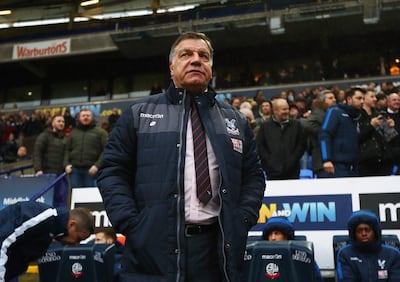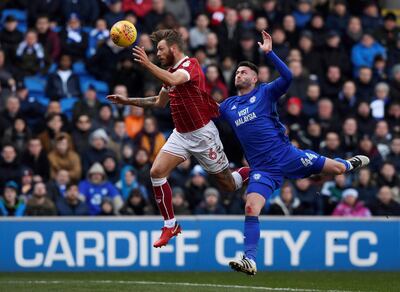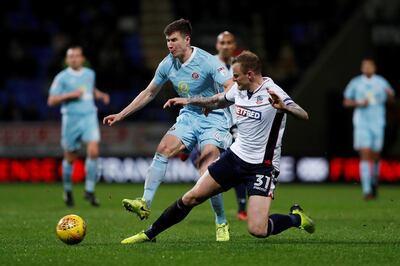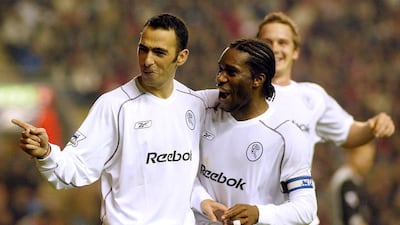In 2007, Bolton Wanderers beat Manchester United in a league game, one which saw Gerard Pique’s Old Trafford future sidelined after he was outmuscled for the only goal of the game.
Wanderers drew 2-2 in Munich against Bayern and won 1-0 in Belgrade against Red Star – the first ever English club to beat them on their own ground.
Bolton boasted players of the calibre of Ivan Campo, Gary Speed, Nicolas Anelka, El Hadji Diouf and the Kevins Davies and Nolan.
They had Sam Allardyce as manager until he stepped down, stating he wanted a break from football - rocking up, remarkably speedily refreshed, at Newcastle United two weeks later.
Wanderers were a well-respected side who finished seventh in England’s Premier League - their fourth successive top eight finish - and were as high as third at one point that season. Bolton’s size and resources made their achievement all the more creditable.
“We played with heart, determination and we had amazing support from the fans,” the former Real Madrid midfielder Campo said of his time in Bolton, that lasted from 2002 to 2008.
“Of course Bolton is different from where I grew up, but I admire it in different ways. The people are honest and working-class. They love football.”
Bolton is not even a city, despite applying for such status, but a hard-bitten town with a population of 128,000 which is part of a much bigger metropolitan area.
____________________________
More Long Reads from Andy Mitten:
Blackburn-Burnley rivalry — enmity that runs deeper than simple geography
Huddersfield Town: A worldly club nestled, finding an edge on a budget
Blackpool: The demise of a club and the rise of its replacements
Wigan Athletic: Climbing back out of obscurity, cleansed and reinvigorated
How a Manchester United tinted revolution sparked at Salford City
____________________________
A fiercely proud place, it has given the world comedian Peter Kay, former world champion boxer Amir Khan and Samuel Crompton, who invented the spinning mule which revolutionised the cotton industry and brought enormous wealth to the North of England in the 19th century.
Bolton Wanderers are the town’s most famous export, a club who, by the noughties had a reputation for wily recruitment, using a mixture of ageing stars on low transfer fees and big wages, leavened with youthful prospects.
Bolton watched Aston Villa’s Gary Cahill in 2007 and then paid £5 million (Dh25.2m) for him at the start of 2008. It helped that they had a wealthy benefactor in owner and lifelong fan Eddie Davies who had been putting money in since 1999, but Wanderers’ model was successful.
Their home was one of Britain’s best new football stadiums, with a profitable hotel under one stand, though when this writer made a complimentary remark about Bolton’s ground to Allardyce, he shook his head, saying: “We built a monument when we needed a stadium.”
Regardless, it was still an architectural gem in the sea of cheap, flat-packed, identikit bowls springing up around England post-Taylor report.
Wanderers had also enjoyed fine cup moments in the Nineties and Noughties, twice reaching the League Cup final and twice the FA Cup semi final.
Renowned stars of the likes of Eidur Gudjohnsen, Fernando Hierro, Youri Djorkaeff and Jay-Jay Okocha had thrilled the crowds, big names with fond memories.
“I love Bolton and the people there,” Gudjohnsen said of his time there from 1998-2000 and then 2014-15. “I had two great times there. I came on a free there and was sold for £4-5 million.”
A decade after 2007, Bolton Wanderers were in England’s third tier. The run of 11 consecutive seasons in the Premier League ended in 2012 and they continued to slide with progressively worse league finishes in the Championship.
By 2015, the club who had beaten Manchester United at Old Trafford in successive seasons at the start of the Noughties did not have the money to pay for any players. Attendances dropped from above 25,000 to below 15,000, the annual wage bill from £53m in 2012 to £13m now.
Worse, the club’s future was threatened because of money owned to HMRC and the ongoing wage bill. Bolton’s debt was £200m, and though Davies wrote off £170m of that, the club was still unable to pay tax owed, or their overheads, forcing them to sell assets, such as their training ground.
“Problems became apparent in October 2015 and came to the boil in January 2016, it happened so quickly,” explained Steve Battersby, a 61-year-old retired chattered accountant who watched his first game with his father in 1964 and has missed only three home games at Bolton’s new home since it opened in 1997.

“Nobody was talking, which usually happens when things start to go wrong, but players were going unpaid and it became a full-blown crisis with winding up orders for unpaid tax and VAT.”
Battersby feared the worst. “I thought the club was heading for administration but various parties became interested in talking over the club. Ken Anderson eventually took over with former player Dean Holdsworth, but from an early stage the pair didn’t see eye-to-eye and Holdsworth soon left, selling his shares to Anderson.”
Anderson, a Monaco based former football agent, is now in charge.
“Ken has effectively run the club as an administrator,” Battersby said. “People appreciate the job he’s doing. Some fans will give him no credit, others see him as the saviour. He’s done a good job in rationalising the club’s finances.
“He’s cut costs and increased off the field revenues, with concerts for example. He’s given the club a more stable financial base.”
It is not going to be easy for Bolton Wanderers, but they already know that. Greater Manchester is Britain’s second biggest conurbation of 2.6 million. It is also home to nine professional football teams. United and City are the giants, Wanderers the third biggest, though Bolton fans identify far more strongly with the ancient red rose county of Lancashire which features on the club badge than the artificial local government unit of Greater Manchester.
The proximity to Manchester, 12 miles to the south east, doesn’t make it any easier for Bolton to attract new fans, though there are exceptions.
“I was born into a United family,” said the Mancunian poet Mike Duff. “Apart from the odd City fan, everyone was United. In 1962, when I was seven, my late brother Kieran asked me which football team I supported and I said 'name a few'. When he said 'Bolton Wanderers' I liked the name. To an impressionable seven-year-old they sounded like winners ... the fifty-five years since has been a catalogue of misery with the rare golden moment.
"But I wouldn’t swap those and I could never support or think of supporting anyone but my Bolton Wanderers. Women have come and women have gone but Bolton have always been there.”
Wanderers were one of 12 founder members of the Football League in 1888 and have spent more years in England’s top-flight without winning the title than any other club.
They won three FA Cups in the 1920s and a fourth in 1958, beating Manchester United three months after the Munich Air Disaster with a team which had cost nothing in transfer fees and featuring five internationals.
The Bolton team bus was attacked by United fans as it passed through Salford on the way home the day after the game, emotions high after a controversial second goal by England forward Nat Lofthouse.
"I’ve followed Bolton Wanderers for over 60 years,” season ticket holder Michael Worsley said. “And my highlight was in my first game, watching us win the FA Cup on television against Manchester United in 1958. I thought it was normal.”
It was not, but Bolton are not so unusual, as Gary Parkinson, former editor of the Bolton fanzine Tripe and Trotters and now global editor at FourFourTwo.com points out.
"Bolton are a fairly typical English club in several ways. They come from the type of working-class industrial areas which provided English football with so many of its long-standing clubs.
They have had some success – like 42 other clubs, they've won the FA Cup, in their case four times – but not an enormous amount: like all but 24 teams, they've never finished top of the English league.
"And like many of those teams from unfashionable, decaying small towns, they suffered after the 1961 abolition of the maximum wage gave players much greater freedom of movement. Having spent all but seven of the Football League's first 75 years in the top division, they spent all but two of the next 30 outside it.
"Returning in the Premier League era via inspirational management – notably from Sam Allardyce – they overachieved (reaching European competition twice) but overstretched, overpaid, and ended up minutes from administration."
After dipping briefly into the third tier, they're now back striving to survive in the Championship on a shoestring.
It is a Friday night in February and the temperature struggles to nudge above zero around the Macron Stadium on the slopes of Winter Hill.
High-flying Bristol City, who had beaten Manchester United six weeks previously and played superbly against Manchester City in the semi-finals of the League Cup, are the visitors.
In ‘Bolton Central’, the club shop on the edge of an out of town retail park by the stadium, the slogan “We work hard. We play together” is displayed prominently. There are signed pictures of bygone heroes for sale: Lofthouse, Frank Worthington, Campo, Ivan Klasnic, Roger Hunt, Gudjohnsen and Jussi Jaaskelainen.
“They’ve had some great players,” said a visiting fan. “Well, we were a big club,” replied his friend as they look at a signed photo Gudni Bergsson.
The current talking point is the departure to Cardiff City of Gary Madine, their leading goalscorer and the man Bolton manager Phil Parkinson built a team around. The sale is an unpopular one, but the striker almost tripled his wages and Bolton will bank £6m, money which will keep the club afloat.
"I understood the chairman's reasons (for allowing Madine to leave)," Parkinson told The National. "The problem we had was it was on the last day of the transfer window when no manager wants to lose his leading scorer.
"With 24 hours to go we felt we were going to keep him. When he left it left us in a difficult position – even if you have money to spend. But we quickly regrouped. We said to the lads: ‘We don’t want to feel sorry for ourselves. The challenge is a greater one now. It’s another opportunity to prove people wrong.”
Wanderers have been doing just that for much of this season and the fans sing ‘Bolton till I die’ to get behind their team as they kick-off against Bristol City.
Wanderers won none, drew two and lost nine of their opening 11 games and were marooned at the bottom of the table.
“After a very, very difficult start where we lost a bit of belief, the transfer embargo ended, we could bring a couple of players in and we’ve drawn ourselves into a group of seven or eight teams fighting the drop,” manager Parkinson said. “We’ve got an 'us against the world' mentality and we’ve given ourselves a chance.”
After going seven games unbeaten, Bolton came out of the relegation zone in December. They had slipped back into it for a time, but the trend is an upwards one.
A win against Bristol City would be their best of the season. The game starts following a minute’s silence for Jimmy Armfield, their deeply respected former manager. It is goalless at half time as the players leave the pitch, passing perimeter adverts for pies and pasties which are served under the stand at half time. The crowd is overwhelmingly white and working-class.
In the sparsely populated press box, Marc Iles is reporting on the match for the Bolton News. He's attended nearly every game for the last 11 years.
“This is a million miles from those Premier League days,” he says, as ‘The Only Way is Up’ optimistically blares out from the public address system. It’s only six years since I was watching Owen Coyle’s team of Gary Cahill, Fabrice Muamba and Stuart Holden.
"They’re fresh in the memory. We had Marcos Alonso at left back, but in a short time the club has fallen onto its knees financially and is only really just showing signs of recovery now.
“This is a club which feared liquidation, never mind administration. It had been a very frightening time to be a Bolton Wanderers fan and fans are now much more aware of how the club is run. Maybe they didn’t realise what they had at the time in the Premier League either, yet the club also has a history of boom and bust and they've had to rebuild through their history.”
Bolton had promised to learn from past mistakes, such as those they made when they came into the Premier League.
“They said they wouldn’t be overspending and would be sensible,” Iles says, “but in the end hearts ruled heads and they did overspend and overstretch, especially in the first season after relegation from the Premier League.

“Ken Anderson has had to make some unpopular decisions selling players and they leave a sour taste, but if the business improves then you could say he’s done a great job.”
Battersby agrees with this verdict. “The sale of Gary Madine in January will probably mean the club make a profit this year, though the timing of the deal was wrong. We also sold Rob Holding to Arsenal and Zach Clough to Nottingham Forest.”
In Bolton’s first game without Madine, things go as well and fans are cheered when, in the 70th minute, Sammy Ameobi strides 30 yards from the midfield and shoots from distance, beating the keeper.
Michael Worsley starts to see positives from the sale. “Madine gave us a predictable style of play. People knew how to play against us. Maybe some good can come from him going.”
The final whistle brings a 1-0 victory, as fans join in with Neil Diamond's Sweet Caroline, ending with the line "Good times never seemed so good".
Parkinson, who has also managed at Colchester United, Hull City, Charlton Athletic and Bradford City is understandably happy and prepared to talk at length about the situation of the club when he took over in 2016.
“There was a bit of a disconnect between the players and the fans. The players needed to have pride in the shirt, to appreciate that our fans are largely working-class people who want them to give it their all,” he said.
Born in nearby Chorley, from where Bolton draw many fans, Parkinson knows the area well.
“I played many games against Bolton including for Bury. Bury considered Bolton to be their main rival and we went to Burnden Park and won 4-2. That was a big day for Bury.”
Many Bolton fans, in contrast, spurn Bury, considering Manchester United to be their rivals, a feeling which is not always reciprocated, though United fans miss the edge which came with trips to Bolton. Bolton’s biggest rivals in more recent times have been Wigan Athletic, who play six miles away. Parkinson arrived just after Bolton’s relegation to England’s third tier.
“The financial situation was well documented and when I met the chairman he said: ‘Look, it’s going to be a tough one to turn this ship around'. I was excited by that challenge. I saw the stadium, the training ground and knew the history. I wanted to get a great club going again.”
Despite operating under a transfer embargo that had been implemented under previous manager Neil Lennon, Parkinson led his side to automatic promotion – the first team to be promoted under such restrictions.

“We had a lot of problems and restrictions, but I detected a good spirit from the players who’d been relegated right from the start. They pulled together through the adversity, the spirit was better than I anticipated.”
Bolton, one of four Greater Manchester clubs in the division with Oldham Athletic, Bury and Rochdale, finished second behind Sheffield United to earn promotion back at the first attempt.
“Then we had the whole summer with a transfer embargo which was really difficult because we’d be competing in a division where teams were buying players for millions. We were unable to spend a penny and survival was our aim.”
Although the embargo has been lifted, Bolton have not bought a player for money for three years, in a league where there’s serious money.
Bolton are the 18th best supported team of the 24, with average crowds of 15,040 this season. Nineteen of the clubs have played Premier League football. With 46 games, the Championship is tough. Only one of the 24 club made a profit in 2015-16, despite 20 of the 24 clubs making a profit on player sales. Wages are the problem, with 15 clubs spending more than their entire turnover on wages.
“It’s a league with several billionaire owners who are all chasing the dream of getting in the Premier League,” Parkinson said. “They know the return on their investment will be worthwhile if they get to the Premier League, that the profile of the club commercially will bring opportunities. Managers will say that this has been the most competitive year in terms of spending power.”
Clubs most recently out of the Premier League receive parachute payments, which makes the fight for promotion for the rest even harder, though Huddersfield Town, showed it can be done last season, while Sunderland and Hull City, two clubs with parachute payments, currently languish 20th and 24th in the Championship.
"Is Ken Anderson the man to take Bolton forward and back to the Premier League?" The National asked Battersby.
“He’ll have a difficult job," Battersby replied. "He’s shown he can hold the fort and he’s done a great job realigning the finances and we’re in a lot better position financially than we have been for a long time. And while fans may dream of a rich benefactor, there is a huge risk in selling to the wrong person and being worse off.”
Manager Parkinson speaks of his immediate aims.
“Our aim is to get to the summer as a Championship club and then spend the budget in the summer wisely,” he said. “We want to invest in good young players who can become assets for the club.
“That’s the next stage for Bolton. We’re realistic to know that we’re not going to compete wages-wise with teams like Derby, Aston Villa or Middlesbrough. But we can try and develop players and be in the market with clubs like Preston North End and Barnsley, who been able to go out and sign players for £4-500,000 and sell a few on for a considerable profit.”

They still have to see this season out in a league which Bristol City’s assistant manager Dean Holden, who started as a young professional at Bolton, describes as "relentless". Parkinson doesn’t disagree.
“The physical demands of the games coming thick and fast mean that you need a squad where you’re happy to change five or six players from a Saturday to a Tuesday. But there’s a lot of honesty in the league, with real committed games. It’s a great spectacle.”
As Bolton currently sit 19th and four points clear of the drop zone, things look much better than they did at the start of the season.
Supporters give much of the credit to their manager. “I like him, he’s pragmatic, he’s composed and calm and we needed that after the madness we’ve been through,” said Battersby, who has seen more changes than most.
But he’s cautiously optimistic about life at the Macron Stadium, located by a motorway junction five miles west of Bolton town centre.
It was originally named after Reebok, the sportswear giant which started life in Bolton in 1895 and while it was a much needed new home, moving was a huge shock to fans like Battersby.
“I missed Burnden Park badly for the first 10 years after we left (in 1997). The intimacy of the ground to the pitch was a big advantage and I liked the town centre location, but time is a great healer and it had seen better days with a supermarket taking up half of one end and creaking floorboards beneath the stand.”
Burnden is still immortalised in song, as fans sing “Walking down the Manny (Manchester) Road, to see the Burnden Aces” but the memories of great football under Charles Foweraker, Bill Ridding, Ian Greaves, Armfield, Bruce Rioch or Colin Todd are best kept at the old ground, the scene of one of the most infamous football disasters, 33 fans dying after a crush at The Railway End in 1946.
Bolton were so desperate for money in 1986 that they sold half that terrace to a supermarket, prompting much teasing from rival fans.
The club left Burnden in 1997 with big ambitions for the future and they realised them, but the ambitions are now scaled back, though they’re looking to bring in investment. But what would they be investing in?
“The new reality of football finances below the top tier is that all second-tier clubs lose money, some at an alarming rate, almost all of them unsustainably gambling on the Premier League,”editor Gary Parkinson said.
“Bolton have been there and done that. Their fans have lived the Chinese proverb about interesting times – of the 12 seasons bookending the 1990s, only two campaigns didn't end in promotion, relegation or the play-offs – but still take pleasure where they can.
“I was at Norwich on Saturday when a patched-up side managed zero shots on target yet ground out a 0-0 draw against a much more lauded team, and the joy in the away end was as tangible as at any Wembley victory.
"Despite the empty vessels in the echo chambers of social media, there's a theory that nobody does humility like football fans: being so accustomed to losing, we accept our fate with equanimity and unrivalled determination to try again. Such is life as a Bolton fan. And I wouldn’t swap it for the world.”


